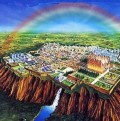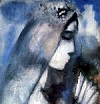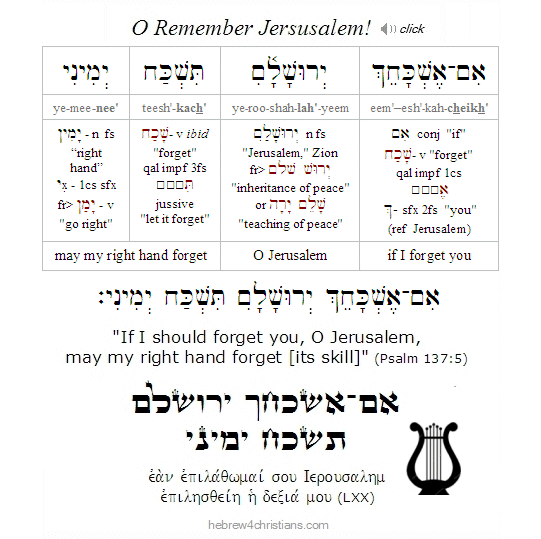|
|
|||||||||||||||||||||
 |
|||||||||||||||||||||
 |
|||||||||||||||||||||
|
|
||||||||||||||||||||||||||||
|
The haftarah for parashat Shoftim (Isa. 51:12-52:12) is the fourth of seven readings from the prophets that are consecutively read before Rosh Hashanah. These "haftarot of comfort" foretell of the restoration of the Jewish people and of the coming of the Messianic Era. In this week's reading, the LORD promised to personally comfort the Jews and restore the glory of Zion, despite their present suffering and exile: "It is I, I who comforts you (אָנכִי אָנכִי הוּא מְנַחֶמְכֶם); who are you that you are afraid of man who dies, of the son of man who is made like grass, and have forgotten the LORD your Maker, who stretched out the heavens and laid the foundations of the earth...?" (Isa. 51:12-13). Some of the sages note that the first word of the Haftarah, the pronoun anochi (אָנכִי), refers to the LORD as the Compassion Savior (יהוה) rather than as God our Judge. Moreover, the phrase, "the LORD your Maker" (i.e., Adonai Osekha: יהוה עשֶׂךָ) should be regarded as "The LORD who is still making you," because the verb (עָשָׂה) is in the present tense (Hirsch: Chumash). When applied to God, the verb asah ("make") emphasizes fashioning something, and suggests "pressing" or squeezing" an object to form it into shape. In this sense the verb is related to the Hebrew word yetzer ("formed") which refers to something shaped, like pottery fashioned by the hand of a potter. Just as a potter purposes a shape before forming an object, so the LORD forms and fashions the character of the soul according to His sovereign purposes (Gen. 2:7, Isa. 29:16; 64:8; Jer. 18:2-6; Lam. 4:2; Rom. 9:21).
אָנכִי אָנכִי הוּא מְנַחֶמְכֶם ah·noh·khee · ah·noh·khee · hoo · me·na·chem·khem "I, I am he who comforts you; who are you that you are afraid of man who dies, Despite the national trauma of the destruction of the Temple and exile into Babylon, the LORD reaffirmed His loyal love for Israel: "I am your LORD .... who will firmly establish you. Say to the inhabitants of Zion, 'You are My people'" (Isa. 51:16). "Speak tenderly to Jerusalem, and cry to her that her warfare is ended, that her iniquity is pardoned, that she has received from the LORD's hand double for all her sins (Isa. 40:2). Though the Jews were punished double for their sins, the time will come when Israel's oppressors will drink the "cup of suffering" which they had forced Israel to drink (Isa. 51:22-23). Hark! Your watchmen raise their voices, Together they shout for joy; for eye to eye they see the return of the LORD to Zion. (Isa. 52:8) The phrase "eye to eye" (עַיִן בְּעַיִן) indicates that the Jews will look upon the LORD directly in the eye. In that coming day, the veil will be taken away and we will no longer see through a mirror "in riddles" (ἐν αἰνίγματι), but rather panim el panim, "face to face" (1 Cor. 13:12). Therefore the LORD foretells when the spell of despair is broken: "Break forth together into singing, you waste places of Jerusalem, for the LORD has comforted his people; he has redeemed Jerusalem" (Isa. 52:9). On that great day, all the ends of the earth shall see the salvation of our God (יְשׁוּעַת אֱלהֵינוּ). "For the Lord will comfort Zion (כִּי־נִחַם יהוה צִיּוֹן); He will comfort all her ruins and will make her desert like Eden, and her wilderness like the garden of the Lord. Joy and gladness will be found in her, thanksgiving and the voice of song. (Isa. 51:3)
רָנּוּ שָׁמַיִם וְגִילִי אָרֶץ rah·noo shah·ma'·yeem ve'·gee·lee ah'·retz "Sing for joy, O heavens, and exult, O earth;
|
|
Hebrew for Christians |
|||||
|
|||||



